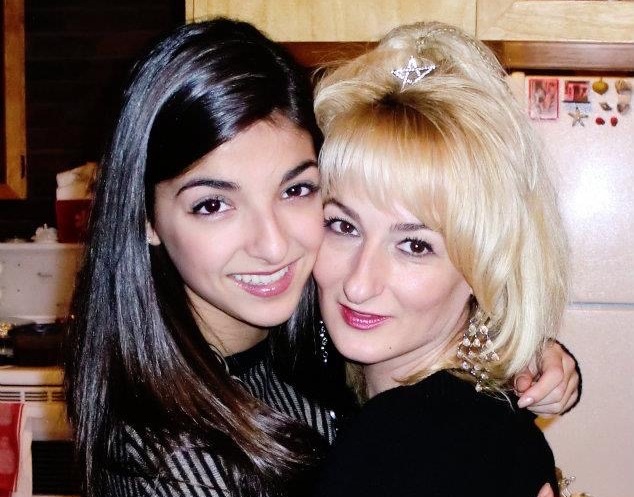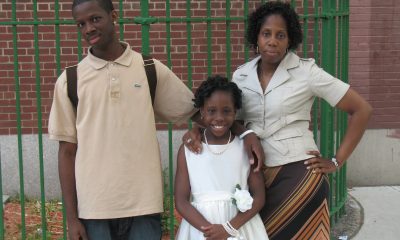by Bianca Zimperi
“Our lives will never be the same without our Lisa.” Those were the words written by my mom as she sat at our kitchen table in disbelief after ten shocking days in the ICU. She was struggling to understand how she found herself having to write an obituary for her beautiful and beloved younger sister, who was just 44 years old and so full of life. All because of a catastrophic brain aneurysm that took our charismatic, larger-than-life, glamourous, bubbly, rockstar, dancing queen, fashionista Lisa on January 19, 2015. Indeed, our lives have never been the same.
We all tackle grief in different ways that permit us to live alongside it and mine has always been writing. The first year after my Teta’s death, I wrote more than I ever had in my life. After I survived the first year without her, I went back and read all the journal entries and thought “wow, I survived THAT.” After that year, I wanted to share my experiences so that grievers could feel less alone in their own grief. So, I wrote An Open Letter to Those Who Are Grieving and one of the main takeaways was that:

“In my opinion, the only forever that exists is love, which makes love the most beautiful and comforting thing in the world. Love has no end, even in death. The moment I lost my Teta I felt incredibly alone and was devasted from believing that nobody was ever going to love me as much or in the way that she did. Thankfully, I realize now that there will never be a moment in my life where she does not love me, and even though she is no longer here, that constant love is the only forever we will ever have. Not forever with time, but forever with love and the same goes for you and your grief as well.”
The response to that letter was a light bulb moment for me. People needed to hear that they were not alone. They needed to hear that others were grieving too. They needed to realize that grief is a sign of love and that they weren’t grieving “wrong.” They needed to be reminded that the constant love from those who die is the only forever we will ever have with them. Not forever with time, but forever with love. Those words I wrote six years ago still ring true today. The fact is, my Teta is not here now, but she was before, and the love she instilled in me can never leave. One of the greatest gifts I’ve ever received in this life was having her, Lisa Doracka, as my Teta, Godmother, and best friend. Not even her death can take that away from me.
There’s not a day that goes by that I don’t miss seeing that “good morning, love you” text or hearing her sing in her kitchen. To say that I “miss” my Teta would be an understatement. Such a small word for such a big emotion, just like “grief” — how can a five-letter word express the monumental change we live through after experiencing it? Grieving is a process, and it is a lifelong one at that. Amazingly enough, as I was writing this article, the number 3:33 showed up on the time, and they have been showing up for me all week. So, I decided to Google “333 angel number” to see what it means. Here’s what I found:
“The number 333 shows that your guardian angel is beside you to provide you with the strength and ability to take one step at a time while you live a stress-free life. If this number manifests in your life, this could be a sign that joy can exist even in the worst situations.”
 Wow, thanks, Teta.
Wow, thanks, Teta.
I couldn’t think of a better way to describe the reality of living alongside grief: joy can exist even in the worst situations, like the death of your loved one. I’d like to sit here and write to you all that after 7.5 years I’ve mastered a way to live in this “new” world without her, but I can’t, I haven’t. I haven’t because that’s not what life after loss is about. It’s not about moving on without your loved one, it’s about learning how to live alongside their memory. It’s about accepting that “joy can exist even in the worst situations.”
I am motivated to speak openly, and proudly about my grief because so much of how our society is structured tells us that to do so is wrong. Fortunately, I now know that most people who think it is wrong, have yet to live alongside grief and survive its emotional wrath personally. I believe that speaking about the realities of grief and educating our society on how to support grievers is one of the most important roles I will ever have in my life. Why? Because we are all going to experience it; some of us multiple times and in different ways.
That fact is why I started my Instagram account Good Grieving. It’s why I became a life coach with a focus on grief, and it’s what gave me the strength to become a lawyer. With Good Grieving I hope to educate and advocate for grievers in a positive way. Grief support isn’t only necessary to learn in case you become a griever yourself and need to know how to ask for help. It’s also important for society at large because just as we will all grieve, we will also all need to support someone who is grieving at some point. No one is above the grief conversation. While we’re not taught how to support grievers, we can certainly learn! And I’m here to teach you if you’re willing.
When my Teta was in the ICU, I would play Led Zeppelin for her, our favourite band. One of the songs I played for her was “All of my Love” a song Robert Plant wrote after the tragic death of his five-year-old son, Karac.
“All of my Love” should be a sign to us all that love and light eventually become more powerful than the pain and loneliness we feel in the early days of losing a loved one. As Robert Plant said: “I would just say there’s no advice [for grief] just love everything around you, as much as you can.”
For more information about Bianca, you can check out her website.
Support us by driving awareness!
Subscribe to our YouTube channel at YouTube.com/GrapGrief.
Follow us on Facebook at Facebook.com/GrapGrief and on Instagram at Instagram.com/GrapGrief.







